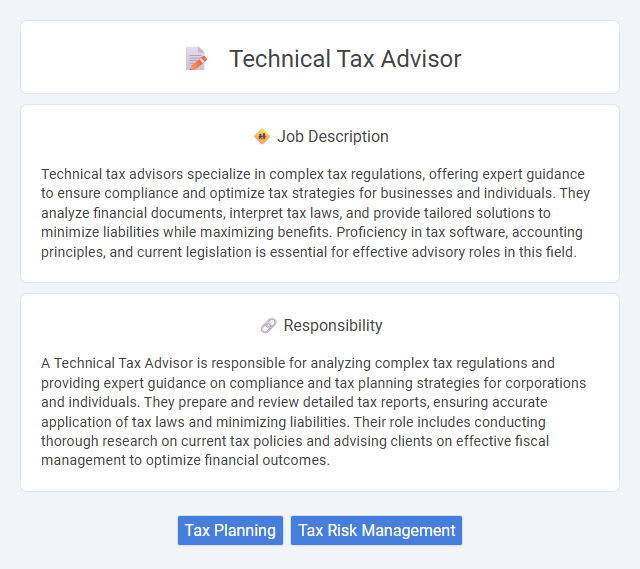
Technical tax advisors specialize in complex tax regulations, offering expert guidance to ensure compliance and optimize tax strategies for businesses and individuals. They analyze financial documents, interpret tax laws, and provide tailored solutions to minimize liabilities while maximizing benefits. Proficiency in tax software, accounting principles, and current legislation is essential for effective advisory roles in this field.
Individuals with strong analytical skills and a detail-oriented mindset are likely to thrive as technical tax advisors, as the role demands precise interpretation of complex tax regulations. Those who enjoy continuous learning and adapting to changing tax laws may find this career suitable due to its dynamic and evolving nature. Candidates who prefer routine work without much regulatory complexity might struggle in this position, given the need for ongoing problem-solving and compliance expertise.
Qualification
A Technical Tax Advisor requires a strong background in accounting, finance, or law, often holding certifications such as CPA, CTA, or equivalent tax qualifications. Proficiency in tax codes, regulations, and compliance standards is essential, along with expertise in tax planning, audits, and dispute resolution. Advanced analytical skills and experience with tax software tools enhance the ability to provide accurate, strategic tax advice to clients or organizations.
Responsibility
A Technical Tax Advisor is responsible for analyzing complex tax regulations and providing expert guidance on compliance and tax planning strategies for corporations and individuals. They prepare and review detailed tax reports, ensuring accurate application of tax laws and minimizing liabilities. Their role includes conducting thorough research on current tax policies and advising clients on effective fiscal management to optimize financial outcomes.
Benefit
Technical tax advisor roles likely offer significant benefits such as specialized expertise in navigating complex tax regulations and optimizing compliance strategies. They may provide higher earning potential due to their niche skill set and ability to reduce financial risks for clients or organizations. Access to continuous professional development and emerging tax technology could further enhance career growth and job stability in this sector.
Challenge
Technical tax advisor roles likely present complex regulatory environments requiring continuous learning and adaptation. Navigating intricate tax laws and staying updated on frequent legislative changes may challenge problem-solving and analytical skills. Effective communication of technical information to clients without tax expertise probably demands both precision and clarity.
Career Advancement
Technical tax advisors specialize in complex tax regulations, providing expert guidance on compliance and strategy to optimize financial outcomes. Advancing in this career often involves gaining certifications such as CPA or Chartered Tax Advisor, alongside continuous education to stay updated with evolving tax laws and technologies. Leadership roles, including senior advisory positions or tax consultancy management, become accessible through demonstrated expertise and a proven track record in delivering effective tax solutions.
Key Terms
Tax Planning
Technical tax advisors specialize in developing strategic tax planning solutions that optimize client financial outcomes while ensuring compliance with current tax legislation. They analyze complex tax regulations, identify opportunities for tax savings, and design effective structures to minimize tax liabilities for businesses and individuals. Expertise in corporate, international, and indirect tax laws enables technical tax advisors to provide tailored planning strategies that align with clients' long-term financial goals.
Tax Risk Management
Technical tax advisors specializing in Tax Risk Management analyze and mitigate tax-related uncertainties to ensure compliance with evolving regulations. They conduct detailed assessments of corporate tax positions, identify potential liabilities, and develop strategies to minimize exposure to audits and penalties. Their expertise supports informed decision-making by integrating tax risk controls into broader financial and operational frameworks.
 kuljobs.com
kuljobs.com